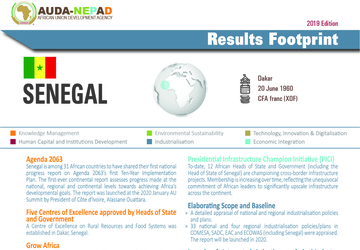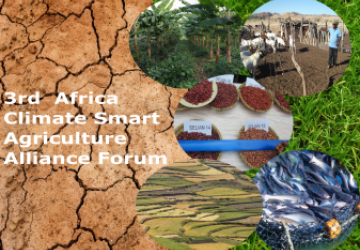 Senegal
Senegal
Official Name: Republic of Senegal
Capital: Dakar
Independence Day: 20 June 1960
Currency: CFA franc (XOF)
Key Result
50 cooperatives of women involved in agri-business received financial and technical support to enhance the quality and profitability of their produce through the PANALE (Produits Africains Normalisés et Accessibles pour un Développement Local et Environnemental) project. 2,500 direct beneficiaries were employed by 50 companies.
A Malaria Research Capacity Development (MARCAD) in South and Central Africa was launched and is based in Senegal.
16 bankable infrastructure projects were showcased at Dakar Financing Summit, the projects have reached pre-feasibility, preparatory or financial close stage.
The Modernisation of Dakar-Bamako Rail Line project is expected to improve connectivity and intra-African trade between Dakar(Senegal) and Bamako (Mali), and other countries, promote regional integration, and help to engender new economic spin-offs/opportunities through rail spurs.
Senegal received funding from the Global Agriculture and Food Security Programme (GAFSP) to a tune of USD 46 million. aimed at promoting the country’s agriculture development agenda.
The Sahel and West Africa Program (SAWAP) contributions to Senegal’s Agribusiness plan will increase food production, raise employment and benefit the wider Sahel region. Support received is to the tune of USD 86 Million.
Related
Projects
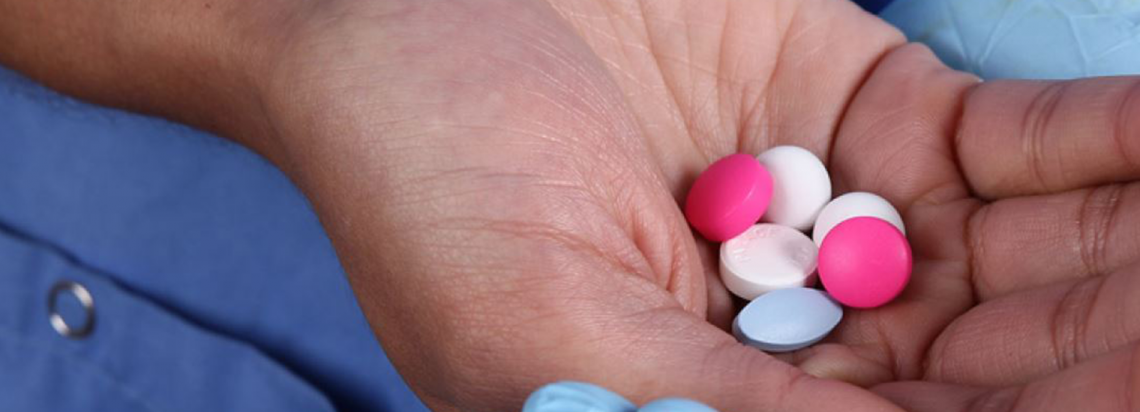
A critical AU Model Law aimed at harmonizing medical products regulatory systems in Africa was endorsed by African Heads of State and Government at the January 2016 AU Summit in Addis Ababa, Ethiopia. The AU Model Law will contribute towards accelerate the regulation of safe, quality and affordable medical products and technologies in Senegal.
The West Africa Medicines Regulatory Harmonization (MRH) programme was launched in 2015 in Accra, Ghana. Senegal participated in the establishment of the joint MRH Project Steering Committee and formation of 7 Technical Working Groups (TWG’s). The TWG’s are tasked with developing technical guidelines of the MRH programme. In addition, a joint framework of collaboration between WAHO and WAEMU has been agreed upon.
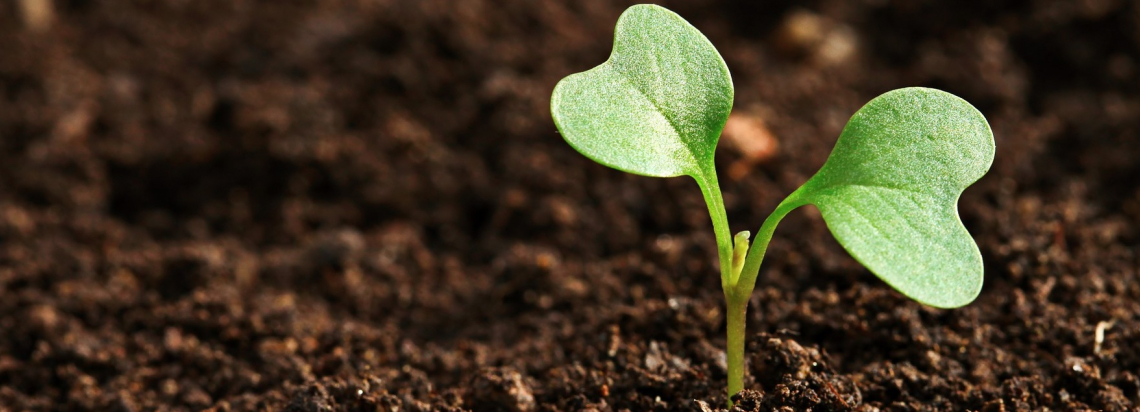
CAADP Compact: Senegal signed the CAADP Compact 0n 9 – 10 February 2010.
Capacity Building: On 4 – 9 June 2010, NEPAD supported Senegal in conducting an Independent Technical Review (ITR).
Business: From 14 - 17June 2010, the NEPAD Agency facilitated Senegal’s first Business Meeting. . Senegal also received support in conducting Agric Joint Sector Reviews and capacity assessments were undertaken.
Funding: The country received funding from the Global Agriculture and Food Security Programme (GAFSP), a multilateral mechanism by the G20 to address funding of country and regional agriculture, amounting to USD 46 million.
Results:
- The implementation of CAADP and the NAIP has had a direct impact on the mobilisation of resources for agriculture, which resulted in an increase in production of cereals, milk, eggs and fish, as well as an increase in agriculture’s contribution to GDP.
- The holding of annual consultations with all stakeholders including the state, private sector, civil society and farmers’ organisations is seen as a positive move. There has since been the creation of a Group for Social and Political Dialogue (GDSP) to improve participation by non-state actors in the implementation of CAADP.
- Senegal has also seen increased investment by the private sector in agriculture, and measures have been taken to improve the business environment, for example, through the exemption of taxes on agricultural equipment.
Agribusiness and Agrifinance Project - Click here for more information

Project : TAH programme
Description : This is phase I of the continental connectivity programme that focuses on completion and standardisation of the TAH missing links by 2030
Project : Single African Sky phase 1 (design and initial implementation)
Description : Single African Sky is a continental programme that will create a high-level, satellite-based air navigation system for the African continent
Project : Yamoussoukro Decision implementation
Description : Accelerate Yamoussoukro Decision implementation by identifying countries that are ready to fully implement it, and discussing and agreeing with both their governments and airlines to launch the voluntary club on a full membership basis;
Project : ICT Enabling Environment
Description : This programme would improve the environment for the private sectors to invest in high-speed broadband infrastructure
Project : ICT Terrestrial for Connectivity
Description : This programme has two main components: secure each country connection by at least two broadband infrastructure and ensure the access to submarine cable to all landlocked countries
Project : Internet Exchange Point (IXP) programme
Description : The aim of this programme is to provide Africa with adequate internet node exchange to maximise internal traffic
Project : Sambangalou Hydropower Project (DFS)
Description : 128 MW of hydropower capacity, 930 km from the mouth of the Gambia River to supply Senegal, Guinea, Guinea Bissau and Gambia
Project : Dakar-Niamey Multimodal Corridor
Description : This programme is designed to modernise the most heavily travelled ARTIN corridor in West Africa (trade facilitation, OSBPs, capacity enhancement and implementation of PPP)
Project : Praia-Dakar-Abidjan Multimodal Corridor
Description : This programme would improve marine transport and the connection between island and mainland countries by creating a new maritime service between regional ports and facilitating this with a modern information system that links the maritime service with ports and road corridor in the Dakar-Abidjan Corridor. This programme would also modernize one of the most heavily travelled ARTIN corridor in West Africa (trade facilitation, OSBPs, capacity enhancement possibly through PPP)
Project : West Africa Hub Port and Rail Programme
Description : This programme aims at responding to the future capacity problems in West African ports. This programme has two components: (a) a regional hub port and rail linkage master plan and (b) port expansion
Project : West Africa Air Transport
Description : This programme aims at increasing the air transport service levels in West Africa, which are currently limited by the lack of a regional air hub
Project : Gourbassy
Description : Multipurpose dam located in Guinea: regulation of the Senegal river (four countries)
Project : Modernisation of Dakar-Bamako Rail Line (DFS)
Description : This project is expected to improve connectivity and intra-African trade between Dakar(Senegal) and Bamako (Mali), and other countries, promote regional integration, and helped to engender new economic spin-offs/opportunities through rail spurs.
Project : Sambangalou Hydropower Project (DFS)
Description : Supply of sustainable electricity to the three countries. Control of the water level in the river basin. Promotion of peace and stability in the region.


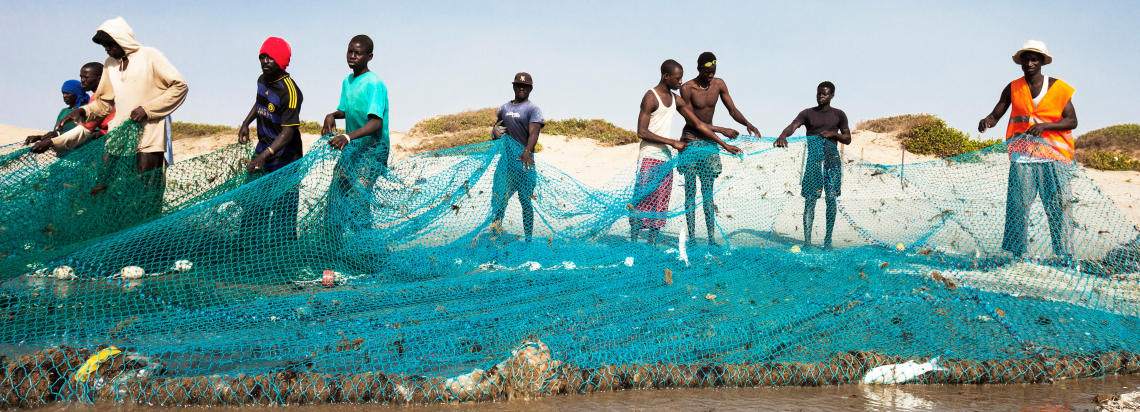
Senegal was one of the seven West African states represented in the Sub-regional Fisheries Committee (SRFC), which was a result of Fisheries and Aquaculture Programme investing in the strengthening of platforms for sub-regional ministers of fisheries. The development of this functional working relationship will facilitate institutional support activities and create a platform for knowledge sharing amongst member states, consequently resulting in the sustainability and prosperity of the fisheries sector in Senegal and the West Africa region.
Results:
•Through Platform Multifunction project (Mboudaye Serere, Ngueye Ngueye and Ndemene) NSF has supported and contributed to equip 5 formalized economic interest group of rural women with 5 electric oil presses, 5 electric peelers, 5 tricycle and mesh machines for building fences.
•Cooperative PANALE 2 500 women of 32 cooperative established agro processing equipment with bar codes allowing exportation of cereals of forest products to export and domestic consumption (PANALE products has entered Supermarket Chains in Senegal).
•Supported REPAO trained women in the fishery sector in the certification process and marketing
•Supported population of GUEDE village to the deployment of Solar Irrigation System and Solar Pump to enhance production and productivity of Agriculture Value Chain.
•Through Platform Multifunction project (Mboudaye Serere, Ngueye Ngueye and Ndemene) NSF has supported and contributed to equip 5 formalized economic interest group of rural women with 5 electric oil presses, 5 electric peelers, 5 tricycle and mesh machines for building fences.
•Cooperative PANALE 2 500 women of 32 cooperative established agro processing equipment with bar codes allowing exportation of cereals of forest products to export and domestic consumption (PANALE products has entered Supermarket Chains in Senegal).
•Supported REPAO trained women in the fishery sector in the certification process and marketing
•Supported population of GUEDE village to the deployment of Solar Irrigation System and Solar Pump to enhance production and productivity of Agriculture Value Chain.
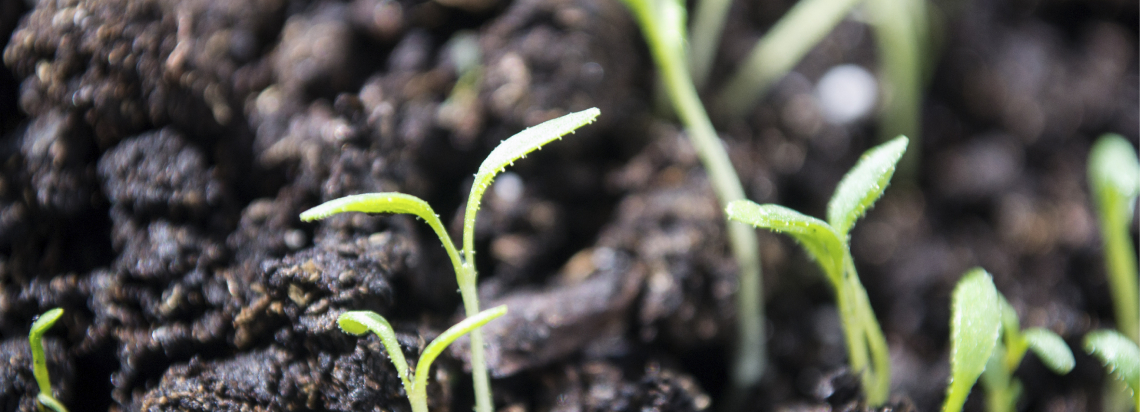
Regional project to strengthen the capacity of fisheries stakeholders to climate change in West Africa
Guinea, Senegal, Cape Verde- Regional Network of Fisheries (REPAO)
• 1,000 copies of a book on scenarios for the growth of fisheries in relation to climate change in West Africa published, disseminated and shared, including online publication
• National information and sensitization workshop were organised in Cape Verde, Guinea and Senegal and communication tools (film, books, leaflets and posters) presented and disseminated
• 1,500 copies in French, English and Portuguese of the documentary film were produced, shared and disseminated at regional level and in Cape Verde, Guinea and Senegal.
• 1,000 leaflets and posters in French, English and Portuguese are printed, shared and disseminated at regional level and in Cape Verde, Guinea and Senegal.
• Information and awareness-raising sessions were organised on processing areas for fishery products for the benefit of women operating in the fisheries sectors in Cape Verde, Guinea and Senegal.
• 3 national committees on climate change in Cape Verde, Guinea and Senegal supported to enable them include fisheries among their priority areas, and to develop proposals for action programmes on fisheries and climate change in the National Adaptation Programmes of Action
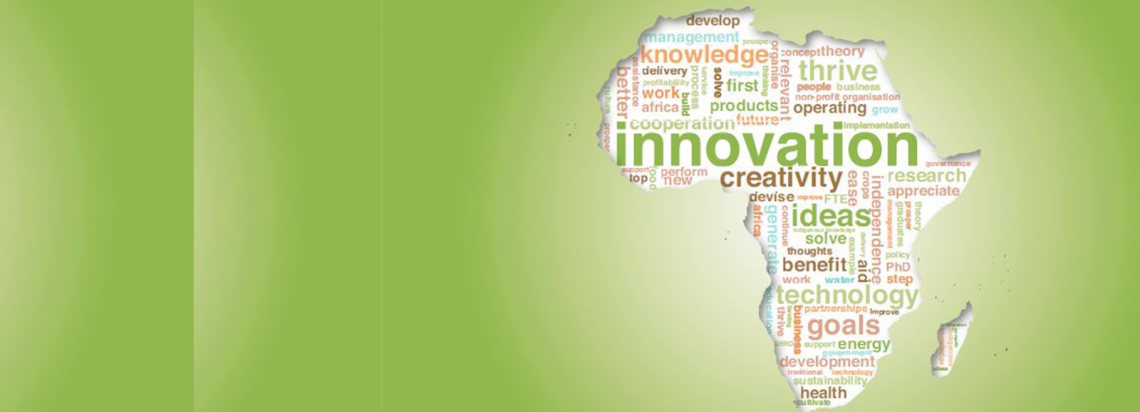
Implementation of the ASTII project commenced in September 2007. Accordingly, the country collected data on R&D core indicators which featured in the 1st African Innovation Outlook (AIO-2010). In addition, both R&D and Innovation indicators featured in the 2nd edition published in 2014 (AIO2014).
The country benefited from regional training workshops organised by the NEPAD/ASTII Team, the UNESCO Institute for Statistics, the South Africa’s Centre for Science, Technology and Innovation Indicators (CeSTII) and Research Policy Institute (RPI) of the University of Lund that were held between 2008 and 2012 on international survey methodologies (OECD).
Senegal received a grant totalling USD95,000 from SIDA for conducting ASTII surveys for the period 2008 and 2013.
Contact: Dr Nouhou Diaby (ndiaby1@gmail.com), Conseiller Technique Coordonnateur du Comité National MAB, Ministère de l'Enseignement supérieur et de la Recherche, Dakar, Sénégal

Results (2013 – 2015)
Advocacy and Strengthening of Negotiation Capacities on Post-2015 Development Agenda through the Common African Position (CAP):
• The multi-stakeholder framework of engagement specifically enhanced dialogue towards ensuring the required mass to influence the Post-2015 Global Agenda and Development Goals relevant to the Continent;
• This intervention helped strengthen country and regional level negotiating capacities for the effective incorporation and articulation of Africa’s priorities as enshrined in CAP in the final Global SDGs;
• The project enabled the participation of African stakeholders at the Means of Implementation Engagement, 3rd Financing for Development Conference and the UN General Assembly that adopted the new SDGs. This ensured the incorporation of Africa’s development priorities into the new goals through developing essential negotiation capacities;
• Through the CAP/SDGs space on the Africa Platform for Development Effectiveness (APDev), knowledge products and negotiation documents, as well as, policy briefs where successfully disseminated to the African negotiators in New York and kept the continent’s stakeholders informed of the overall process;
• Development and dissemination of post-2015 Policy Briefs on “Financing and Partnerships” and “Structural Economic Transformation and Inclusive Growth”. These are priorities outlined in the CAP and the policy briefs where utilized in the negotiation process for the African continent.
Global Partnership for Effective Development Cooperation (GPEDC):
• Africa secured the hosting of the 2nd High Level Meeting (HLM) of the Global Partnership. This was attained through robust negotiation and facilitating a common voice from Africa with regards to this critical engagement by the NEPAD Agency. The 2nd HLM will be held in Nairobi Kenya;
• The NEPAD Agency advocated for the full inclusion and participation of Africa’s Regional Economic Communities (RECs) in conducting the 2nd GP Monitoring Exercise. This was a fundamental achievement considering the RECs are the continent’s building blocks with regards to socio-economic transformation;
• The Africa Action Plan on Development Effectiveness (AAP) was granted the status of an official Global Partnership Initiative (GPI) at the Planning Meeting in Brussels. The AAP was developed by the NEPAD Agency in consultation with African multi stakeholders. This has enabled the Agency to successfully mobilize resources towards the implementation of the AAP.

Project : Hydro – Sambangalou Hydropower Project
Countries/Region : Gambia, Guinea Conakry, Guinea Bissau and Senegal | West Africa region
Project Location : Located 930 km upstream from the mouth of the Gambia River. The dam will be located in Senegal with part of the reservoir in Guinea.
Sector/Subsector : Energy/Generation
Project Description : A hydropower plant with a 128 MW capacity, as well as a 185 square kilometer reservoir (4 turbines of 32 MW each). Originally formed part of a larger Gambia River Basin Development Organisation (OMVG) Project, which entailed an interconnecting power grid with the Kaleta Dam in Guinea
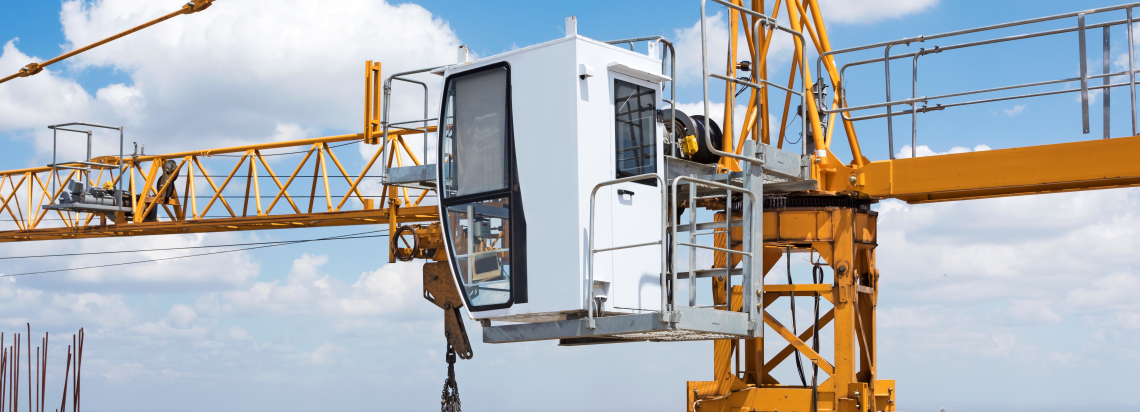
Description : The use of political gravitas and goodwill to unblock and facilitate political bottlenecks affecting the implementation of ICT broadband and optic fibre projects on the continent

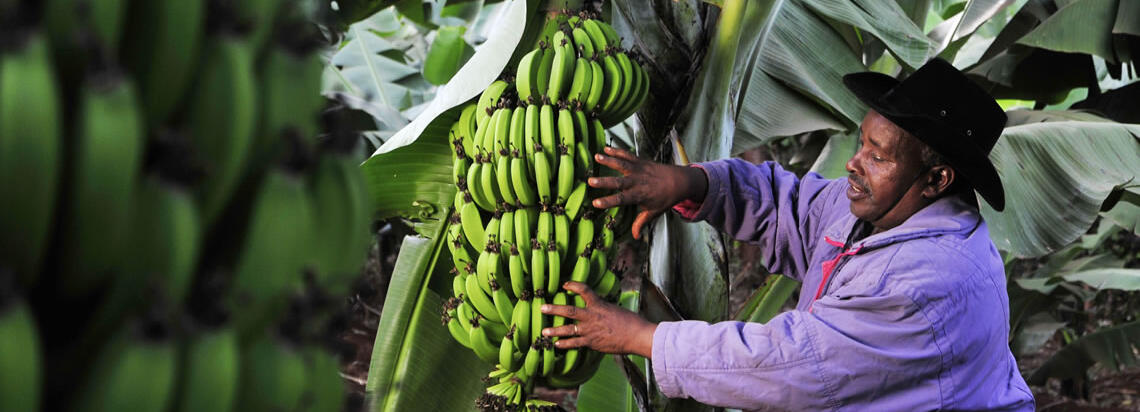
New Alliance for Food security and Nutrition and Grow Africa Partnerships: 41 LOIs from 25 domestic companies and
16 international.
• $571,100,000 of planned investment.
• $23,198,951 reported as invested in 2014,
making a cumulative total of $114,044,451
to date.
• 90,087 smallholders reached in 2014.
• 1,663 jobs created in 2014.
• $195 million donor disbursements in 2014
(233% of expected).
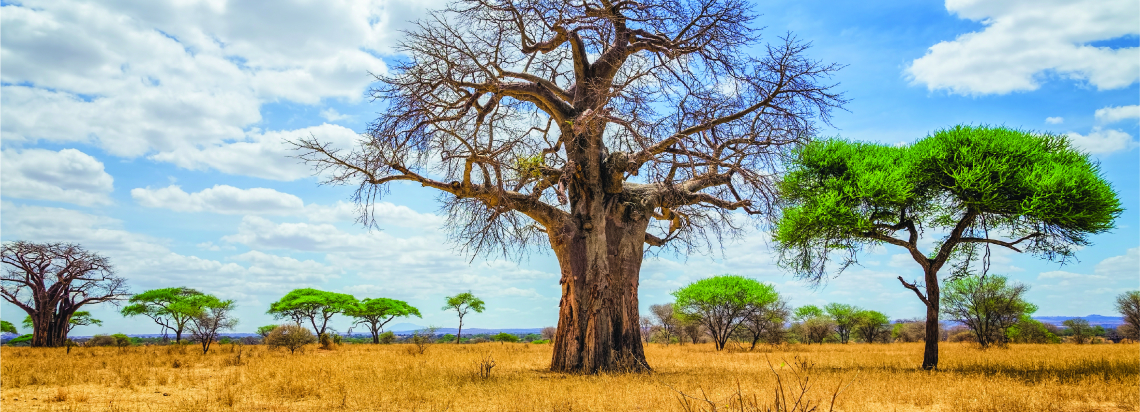
- SLM Knowledge Base: Through the support of the TerrAfrica Leveraging Fund (TLF), TerrAfrica’s Regional SLM Knowledge Base has been generated and disseminated. It contains tools, documents, and practical information to assist in SLWM upscaling at national, regional and continental level. Senegal is in the process of creating a country specific information system.
- Through the support of the TerrAfrica Leveraging Fund (TLF), Senegal has integrated SLWM into the national environmental and agricultural frameworks through the development of SLM Country Strategic Investment Frameworks (CSIF). Senegal has completed its analyses on the costs and benefits of SLM options in Mali.
- As a result of the development of a CSIF, Senegal has been able to align stakeholders and resources towards the implementation of its Strategic Investment Program (SIP), The Senegal Agricultural Markets and Agribusiness Development Project, which focuses on improving the competitiveness of selected domestic supply chains, increase non-traditional agricultural exports and increase rice production in project areas.
- The Sahel and West Africa Program (SAWAP) contributions to Senegal’s Agribusiness plan will increase food production, raise employment and benefit the wider Sahel region. Support received is to the tune of $ 86M.
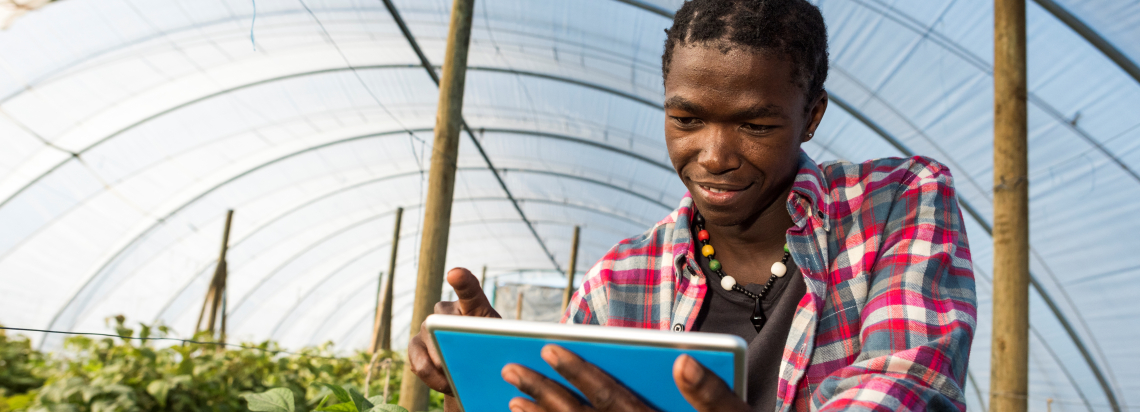
An Agricultural Risk Assessment study is being conducted with the specific objective of complementing the World Bank risk assessment study conducted in 2014. The complementary study will include the areas of livestock and fisheries. These specific dimensions including a Capacity Development component will be integrated into the second generation of CAADP National Investment Plan. Based on the outcomes of the study, together with the specific request from the Government of Senegal for improving the management of post-harvest losses, identified tools and policy instruments will be designed and implemented in the country.
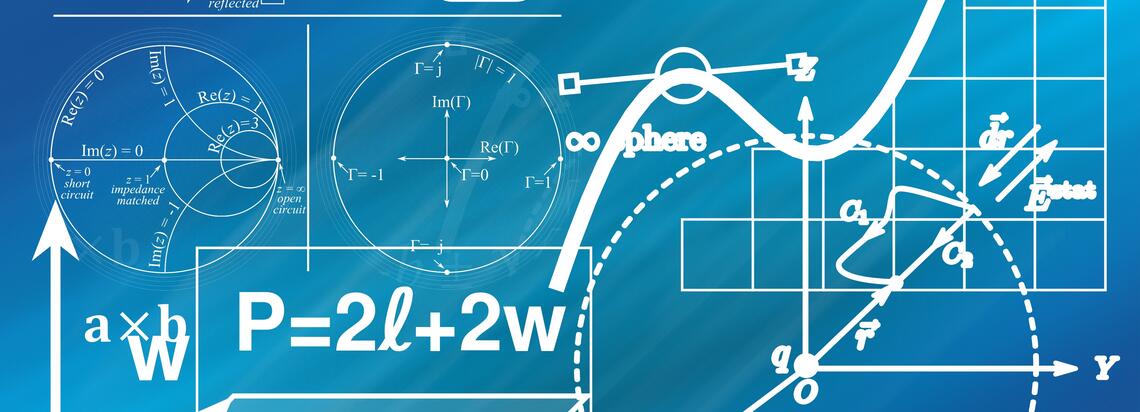
Project: AIMS-Senegal
Decsription:
The African Institute for Mathematical Sciences AIMS-Senegal has been founded by the partnership of Vincent Rivasseau and Mamadou Sanghare supported by Neil Turok's Next Einstein Initiative. AIMS-Senegal is a new pan-African institute for post-graduate training and research in mathematical sciences opened on September 2011 in MBour and includes a newly research centre. As part of the African Institute of Mathematical Sciences Next Einstein Initiative (AIMS-NEI), AIMS-Senegal implements the AIMS-model to build an international centre of excellence in the mathematical sciences.
Based in MBour, the AIMS-Senegal campus is located in a seaside nature reserve with modern eco-architecture, inspiring views and space for many students and researchers, providing them with all the infrastructure and facilities required to be an international centre of excellence.
The research program at AIMS-Sénégal covers pure and applied fileds in mathematical sciences. Currently the research directions are: Noncommutative Algebra, Cryptography, Number theory, Partial Differential Equations, Differential Geometry and Mathematical modelling applied to fishery and ecology.The research program at AIMS-Senegal is supported by the German Federal Ministry of Education and Research via the Alexander von Humboldt Foundation and the German Academic Exchange Service (DAAD). They act as partners in the project to promote networking between AIMS Senegal and German universities as well as with other AIMS centers.
you agree to the AUDA-NEPAD Privacy Policy.






